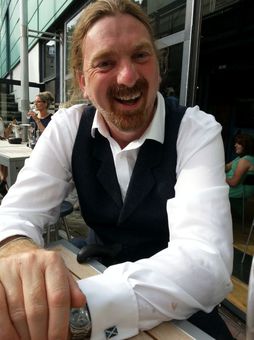Schottische
This week saw the official launch of Open Rights Group Scotland, and I found myself doing a mini-tour of talks on something like the history of the battles over civil liberties in cyberspace to help celebrate. I have no idea what I actually said but there are recordings...somewhere.
What follows is a précis of what I learned in the process about the situation in Scotland, some from ORG's new Scotland officer, Pol Clement-Smith, but mostly, of course, from various audience members.
- The sheer relish and pride with which new MP for Dundee West Chris Law is exploring the weird and wacky rituals of Parliament is awe-inspiring.  The 56, as he explained, represent a real cross-section of Scottish society (he himself is a Dundee-based self-employed financial advisor). Few are lawyers, some are new to political office of any kind. If they're all as enthusiastic and widely gregarious as he is, maybe they can keep each other from being infected by the Westminster bubble. (Note Law's saltire cufflinks in the photo.)
The 56, as he explained, represent a real cross-section of Scottish society (he himself is a Dundee-based self-employed financial advisor). Few are lawyers, some are new to political office of any kind. If they're all as enthusiastic and widely gregarious as he is, maybe they can keep each other from being infected by the Westminster bubble. (Note Law's saltire cufflinks in the photo.)
- The Regulation of Investigatory Powers Act (2000)'s Scottish analogue, the Regulation of Investigatory Powers Scotland Act, seems to have all the familiar problems. In November, Glasgow Herald reported that in 2013 there were 19,390 authorizations and notices issued under RIPSA, up from 18,382 in 2012; police had used RIPSA to access journalists' sources and security services to spy on lawyers and their clients. ORG Scottish officer Pol Clement-Smith notes that half of all RIPSA requests come from...Dundee. Not the name you would really expect to be the interception capital of Scotland - although Clement-Smith did mention that the notorious Kray twins hid out there at some point when they needed to escape London.
- A big issue - and one of the reasons for setting up ORG Scotland - is the plans for "entitlement cards" (a name that brings back memories from the ID card battles in England from 2005 to 2010, when the incoming coalition government finally killed it) that will not only provide a national ID register but link to NHS data. The plans were opposed by the now largely voiceless LibDems, and No2ID Scotland has taken up the cudgels.
- Among the 120 agencies and other organizations that would have access to all this data, health included, is Quality Meat Scotland, for reasons that puzzle Clement-Smith. A search returns Scottish Parliamentary questions (in which the opinion is given that CCTV should be operating in all abattoirs) and myriad news stories about illegal halal meat, such as this one mentioning "traceability issues" may be relevant: apparently the sparsely settled areas of the Scottish highlands are hotbeds of meat crimes.
- More interesting, an audience member in Glasgow pointed out a risk of the Internet of Things that we suspected but hadn't yet been found in the wild. In 2013, at a Westminster eForum event on smart living, Brian Devlin, from Glasgow City Council outlined the city's plans for smart street lighting, which would save a large portion of the council's energy bill by powering down when no one was around. The audience member, involved with the Scottish Palestine Solidarity Campaign, commented that these streetlights are also fully kitted out with surveillance equipment such as microphones, cameras, and other sensors. In other words, what was presented and sold to the public as an energy-saving device carried comprehensive monitoring facilities as a stowaway - to fight crime, of course. Part of her objection was that the system was made by an Israeli company; that seems less important than the fundamental point, which is that there are many dangers inherent in the Internet of Things, not least the difficulty of auditing what all the Things do. Eugene Kaspersky has taken to calling it the Internet of Threats, though his meaning has much more to do the vulnerability of each element to attacks.
- Also highly controversial is the Named Person legislation, part of the Children and Young People (Scotland) Act, which requires every child under 18 in Scotland to be assigned a state-approved "named person" - a teacher, health visitor, or someone else who is not the child's parent and who will be authorized to report concerns about the child''s well-being to the authorities. All sorts of people are worried about this - Christians, the Scottish Parent-Teacher Council, and others. As a non-lawyer, it's hard to see how the law conforms to the right to privacy of family life enshrined in article 8 of the European Convention on Human Rights. The law has been challenged in court by the No2NP (No to Named Persons) campaign.
- Other details from Clement-Smith: Scotland is the most centralized country in Europe: a unicameral parliament and a single police agency, Police Scotland. The age of criminal responsibility - eight - is one of the lowest in Europe, and Scotland also has the highest figures in the UK for stop-and-search of children. A 2014 study found 72 instances regarding kids under seven. Four hundred and fifty-five people own two-thirds of the land, a situation that a government commission is looking, astonishingly, at reforming. Also an issue: large, single contracts that tie councils into sole vendors who then own all the data.
So: watch that space.
Wendy M. Grossman is the 2013 winner of the Enigma Award. Her Web site has an extensive archive of her books, articles, and music, and an archive of earlier columns in this series. Stories about the border wars between cyberspace and real life are posted occasionally during the week at the net.wars Pinboard - or follow on Twitter.